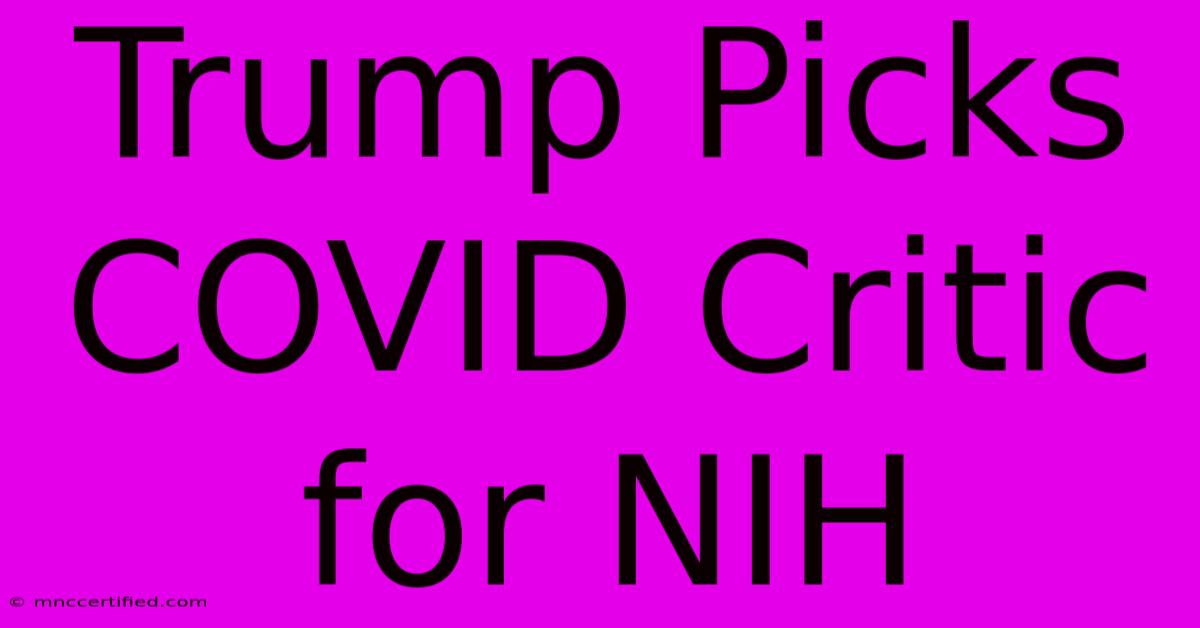Trump Picks COVID Critic For NIH

Table of Contents
Trump Picks COVID Critic for NIH: A Controversial Appointment
The appointment of Dr. [Insert Name] to a key position within the National Institutes of Health (NIH) under the Trump administration sparked significant controversy. Dr. [Insert Name], a vocal critic of the administration's COVID-19 response, was chosen to oversee [Insert Specific Department/Area of NIH]. This decision raised eyebrows amongst scientists, public health officials, and the general public, highlighting the complex interplay between political appointments and scientific expertise.
Understanding the Controversy: Dr. [Insert Name]'s Stance on COVID-19
Dr. [Insert Name]'s outspoken criticism of the Trump administration's handling of the COVID-19 pandemic was a major factor contributing to the controversy surrounding this appointment. Specifically, [Insert Specific Criticisms]. These criticisms, often voiced publicly through [Mention platforms like interviews, publications, etc.], directly contradicted the official narrative promoted by the administration. This public dissent made the appointment particularly surprising and contentious.
The Clash Between Science and Politics
The appointment underscores a broader concern regarding the politicization of science. Many argued that appointing someone with such a strong and publicly expressed dissenting opinion on the administration's COVID-19 strategy could jeopardize the NIH's credibility and its ability to effectively conduct and disseminate crucial research. Critics worried that political considerations outweighed scientific merit in this selection process.
Potential Impacts on NIH Research and Funding
The appointment's implications for NIH research and funding remain a subject of debate. Some fear that Dr. [Insert Name]'s appointment might lead to:
- Shifts in research priorities: Funding could be redirected away from research aligned with the prevailing scientific consensus on COVID-19.
- Suppression of dissenting views: Scientists holding different perspectives on COVID-19 might face pressure to conform to the administration's preferred narrative.
- Erosion of public trust: The perceived politicization of the NIH could undermine public confidence in its scientific findings.
Analyzing the Appointment: Political Motivations and Consequences
Several interpretations exist regarding the administration's motivations behind this controversial appointment. Some posit that it was a strategic move to:
- Gain political leverage: Appointing a prominent critic might be seen as an attempt to appease or neutralize opposition within the scientific community.
- Diversify perspectives: The administration might have believed that incorporating diverse viewpoints, even dissenting ones, would benefit the NIH's decision-making process.
- Signal a shift in strategy: The appointment could indicate a change in the administration's approach to the pandemic.
However, the potential consequences of this appointment are far-reaching and potentially negative:
- Damaged credibility of the NIH: The appointment has raised concerns about political interference and compromised the integrity of the institution.
- Hindrance to effective pandemic response: A politicized NIH could hamper its ability to provide unbiased research and guidance crucial for managing a public health crisis.
- Weakening of public health infrastructure: The controversy could further erode public trust in scientific institutions and expert advice, making it harder to combat future public health challenges.
Conclusion: Long-Term Implications and Future Outlook
The appointment of Dr. [Insert Name] to the NIH remains a highly debated topic. Its long-term implications for the NIH, scientific integrity, and the nation's public health infrastructure remain to be seen. This case serves as a stark reminder of the delicate balance between political appointments and the vital need for independent scientific expertise in government agencies. Further analysis and observation are crucial in assessing the full impact of this controversial decision. The ongoing debate highlights the importance of transparency, accountability, and the unwavering commitment to evidence-based decision-making in matters of public health.
Keywords: Trump, NIH, COVID-19, appointment, controversy, Dr. [Insert Name], politics, science, public health, research, funding, criticism, pandemic response, politicization of science, scientific integrity, public trust.
Off-page SEO Strategies: Promote this article on social media platforms relevant to political news and scientific discussions. Engage in relevant online forums and discussions to share insights and perspectives. Consider outreach to journalists and news organizations covering this topic.

Thank you for visiting our website wich cover about Trump Picks COVID Critic For NIH. We hope the information provided has been useful to you. Feel free to contact us if you have any questions or need further assistance. See you next time and dont miss to bookmark.
Featured Posts
-
Renew Auto Insurance Online Bc
Nov 27, 2024
-
Espn North Carolina Parts Ways With Brown
Nov 27, 2024
-
Bissonnette Attacked Six Men Involved
Nov 27, 2024
-
Used Car Dealer Insurance Cost
Nov 27, 2024
-
Ofcom Complaints Surge Controversial Star On This Morning
Nov 27, 2024